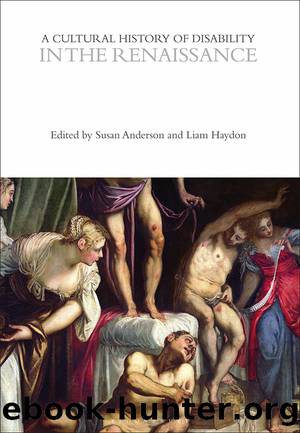A Cultural History of Disability in the Renaissance by Susan Anderson;Liam Haydon;

Author:Susan Anderson;Liam Haydon;
Language: eng
Format: epub
Publisher: Bloomsbury UK
CHAPTER FIVE
Deafness
Deafnesses and Silences in Shakespeareâs England
JENNIFER NELSON
In early modern England, including in Shakespeareâs plays, deafness and silence are frequently used as devices of empowerment by hearing people; to fine tune this concept, deaf people are not allowed a similar luxury (Nelson and Berens 1997).1 I have often been told, âBut Shakespeare and other writers show deafness as a Good Thing!â A general example of this positivity might be the phrase âto turn a deaf ear,â which means to ignore someone willfully in order to seize control of the argument or conversation. A notable example of this is Ferdinand of The Duchess of Malfi by John Webster. When the Duchess tells her brother that âa scandalous report is spread / touching mine honor,â Ferdinandâs response is as hopeful as it is unsuccessful: â[L]et me be ever deaf to itâ (3.1.48). Ferdinandâs inability to be deaf to anything concerning his sisterâs chastity finally results in her death, those of her family, and his own; being âdeafâ here may have helped this situation.
Phrases such as this are used to empower the hearing, not disable them, and many early modern works are rife with these selectively deaf referencesâhence the âgood thingâ comment, which ties in with the current concept of âDeaf Gain.â As coined, Deaf Gain is used to âcounter the frame of hearing loss as it refers to the unique cognitive, creative, and cultural gains manifested through deaf ways of being in the worldâ (Bauman and Murray 2014: xv). I will be using the lowercase âdeafâ in this chapter for deaf people as the capital D concept was not used in the early modern period. I will use the capital D for Deaf in Deaf Gain as that is modern usage. Although Deaf Gain certainly was not a concept then, it works well in framing how deafness was used and exploited in the literature of the time.
5.1. FINDING A KIND OF DEAF GAIN IN EARLY MODERN LITERATURE AND CULTURE
The usual strategy in the works of Shakespeare, Spenser, Jonson, Traherne, and others is either to wish for temporary âdeafnessâ in the face of the worldâs voices in order to seize control or to be silent in order to shut out the poisoned outer world and to take control (Nelson and Berens 1997). However, this is a very lopsided âgood thing,â a partial kind of Deaf Gain in terms of lack of extension to those who are deaf in real life, which ultimately reveals the audism in the concept. According to Bauman and Murray, the concept of Deaf Gain involves a different paradigm and understanding not of loss, but of difference: âTo many in the deaf community, being deaf has nothing to do with âlossâ but is, rather, a distinct way of being in the world, one that opens up perceptions, perspectives, and insights that are less common to the majority of hearing personsâ (2014: xv). As such, marginalized knowledge is now being seen in a gainful and positive way. Looking to deaf people and their language âincreases the already astounding variation on ways to be humanâ (2014: xix).
Download
This site does not store any files on its server. We only index and link to content provided by other sites. Please contact the content providers to delete copyright contents if any and email us, we'll remove relevant links or contents immediately.
Spell It Out by David Crystal(35840)
Life for Me Ain't Been No Crystal Stair by Susan Sheehan(35530)
Cecilia; Or, Memoirs of an Heiress — Volume 1 by Fanny Burney(32054)
Cecilia; Or, Memoirs of an Heiress — Volume 3 by Fanny Burney(31453)
Cecilia; Or, Memoirs of an Heiress — Volume 2 by Fanny Burney(31402)
The Great Music City by Andrea Baker(30779)
Professional Troublemaker by Luvvie Ajayi Jones(29417)
We're Going to Need More Wine by Gabrielle Union(18626)
Twilight of the Idols With the Antichrist and Ecce Homo by Friedrich Nietzsche(18297)
The Secret History by Donna Tartt(18151)
Cat's cradle by Kurt Vonnegut(14756)
All the Missing Girls by Megan Miranda(14711)
Pimp by Iceberg Slim(13772)
Bombshells: Glamour Girls of a Lifetime by Sullivan Steve(13680)
Fifty Shades Freed by E L James(12908)
Talking to Strangers by Malcolm Gladwell(12864)
Norse Mythology by Gaiman Neil(12820)
The Social Justice Warrior Handbook by Lisa De Pasquale(11950)
Underground: A Human History of the Worlds Beneath Our Feet by Will Hunt(11832)
